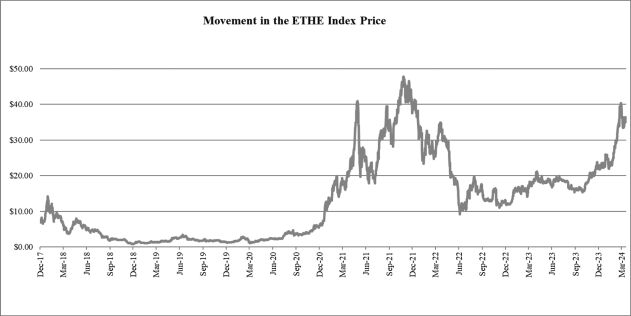participants’ ability to convert the digital asset into U.S. dollars. Any assertion that a digital asset is a security by the SEC or another regulatory authority may have similar effects.
For example, in 2020 the SEC filed a complaint against the issuer of XRP, Ripple Labs, Inc., and two of its executives, alleging that they raised more than $1.3 billion through XRP sales that should have been registered under the federal securities laws, but were not. In the years prior to the SEC’s action, XRP’s market capitalization at times reached over $140 billion. However, in the weeks following the SEC’s complaint, XRP’s market capitalization fell to less than $10 billion, which was less than half of its market capitalization in the days prior to the complaint.
Likewise, in the days following the announcement of the Binance Complaint and Coinbase Complaint, the price of various digital assets, including Bitcoin and Ether, declined significantly and may continue to decline as these cases advance through the federal court system. Subsequently, in July 2023, the District Court for the Southern District of New York held that while XRP is not a security, certain sales of XRP to certain buyers amounted to “investment contracts” under the Howey test. The SEC later sought an interlocutory appeal of the district court’s verdict that XRP is not a security, which appeal was denied by the district court in October 2023. Moreover, also in July 2023, another judge in the District Court for the Southern District of New York, in litigation between the SEC and the issuer of the UST and LUNA digital assets, suggested that he disagreed with the approach underlying the XRP decision. The Binance Complaint, the Coinbase Complaint, the Kraken Complaint, and the SEC’s actions against XRP’s issuer and the issuer of the UST and LUNA digital assets, as well as seemingly inconsistent views of different district court judges, underscore the continuing uncertainty around which digital assets are securities, and demonstrate that such factors as how long a digital asset has been in existence, how widely held it is, how large its market capitalization is and that it has actual use in commercial transactions, ultimately may have no bearing on whether the SEC or a court will find it to be a security.
In addition, if Ether is in fact a security, the Trust could be considered an unregistered “investment company” under SEC rules, which could necessitate the Trust’s liquidation. In this case, the Trust and the Sponsor may be deemed to have participated in an illegal offering of securities and there is no guarantee that the Sponsor will be able to register the Trust under the Investment Company Act at such time or take such other actions as may be necessary to ensure the Trust’s activities comply with applicable law, which could force the Sponsor to liquidate the Trust.
Moreover, whether or not the Sponsor or the Trust were subject to additional regulatory requirements as a result of any determination that its assets include securities, the Sponsor may nevertheless decide to terminate the Trust, in order, if possible, to liquidate the Trust’s assets while a liquid market still exists. For example, in response to the SEC’s action against the issuer of XRP, certain significant market participants announced they would no longer support XRP and announced measures, including the delisting of XRP from major digital asset trading platforms, resulting in the Sponsor’s conclusion that it was likely to be increasingly difficult for U.S. investors, including Grayscale XRP Trust (XRP), an affiliate of the Trust, to convert XRP into U.S. dollars. The Sponsor subsequently dissolved Grayscale XRP Trust (XRP) and liquidated its assets. If the SEC or a federal court were to determine that Ether is a security, it is likely that the value of the Shares of the Trust would decline significantly. Furthermore, if a federal court upholds an allegation that Ether is a security, the Trust itself may be terminated and, if practical, its assets liquidated.
Regulatory changes or actions by the U.S. Congress or any U.S. federal or state agencies may affect the value of the Shares or restrict the use of Ether, validating activity or the operation of the Ethereum Network or the Digital Asset Markets in a manner that adversely affects the value of the Shares.
As digital assets have grown in both popularity and market size, the U.S. Congress and a number of U.S. federal and state agencies (including FinCEN, SEC, CFTC, FINRA, the Consumer Financial Protection Bureau (“CFPB”), the Department of Justice, the Department of Homeland Security, the Federal Bureau of Investigation, the IRS, the Office of the Comptroller of the Currency, the Federal Deposit Insurance Corporation, the Federal
A-38
